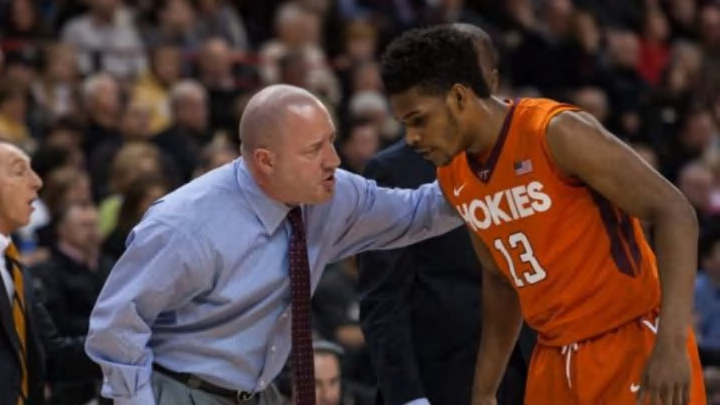Virginia Tech is taking a leap under second-year head coach Buzz Williams, and it’s evident by their hot start in ACC play.
Virginia Tech’s program had struggled in it’s previous two seasons in the post-Seth Greenberg era. The Hokies went 22-41 (.349) under head coach James Johnson, who was an assistant on Greenberg’s staff, and were 6-30 (.167) in ACC play.
From the beginning it wasn’t going to be easy for Buzz Williams to turn around Virginia Tech’s program, but he’s doing it quicker than some expected.
Hokies’ athletic director Whit Babcock could not have hired a better coach to try and turn around a rather dead program. In six seasons at Marquette, Williams led the program to five NCAA tournament appearances. He also took the Golden Eagles to two Sweet 16s and one Elite Eight.
Related Story: Every NBA Team's Star Wars Counterpart
The turnaround that Williams has made with the Virginia Tech program is quite incredible, and one of the least talked about storylines in college hoops. He has the Hokies towards the top of the ACC with a 4-1 conference record and they are 12-6 overall, which is already better than the 11-22 record they posted in Williams’ first season as head coach.
What is most remarkable about this year’s team is that they are winning as a young, inexperienced group. One reason they have played well is that Williams has players that fit his system and players that have bought-in to his system.
The Hokies have four players averaging in double figures. Leading scorer Zach LeDay is a redshirt junior that transferred from South Florida. He played 63 games in two seasons at USF and averaged 4.1 points and 2.5 rebounds per game. At Virginia Tech he’s leading the team in points (15.2) and rebounds (9.1) per game.
Seth Allen is another redshirt junior that transferred from Maryland. Allen, a Virginia native, is the team’s second-leading scorer with 13.3 points per game. While at Maryland, however, Allen averaged 13.4 points per game after playing in 20 games his sophomore season.

The team gets a lot younger from there. Sophomore Justin Bibbs is one of the best three-point shooters in the country. He’s sixth in the NCAA in three-point percentage, knocking down 55.6 percent of his three-point attempts. That’s better than Oklahoma’s sensational guard Buddy Hield.
True freshman Chris Clarke has made a large impact on the Hokies. He’s averaging 10.5 points, 7.5 rebounds and a team-best 1.1 steals per game. Clarke was expected to have a good college career after ranking 54th in ESPN’s 2015 Top 100 recruiting class.
After playing 11 games, however, Clarke fractured his foot and will be out of the Hokies’ lineup indefinitely, according to the Roanoke Times‘ Mark Berman.
Virginia Tech also gets good production on both ends of the court from junior Devin Wilson, sophomore Jalen Hudson and true freshman Kerry Blackshear Jr. and Justin Robinson. The young Hokies have shown that their game is maturing and improving quickly.
On Saturday, the Hokies overcame a 14-point deficit on the road against the Georgia Tech Yellow Jackets to win 78-77. They also have close wins against NC State (73-68), Wake Forest (93-91) and then fourth-ranked Virginia (70-68). Three of those four conference wins came at home in front of a rather sparse Cassell Coliseum crowd.
The lone ACC loss came on the road against perennial powerhouse Duke, 82-58. However, it was hot shooting that allowed the Blue Devils to jump out to a 50-23 halftime lead. The Hokies cut the deficit in the second half and forced Duke coach Mike Krzyzewski to put his starters back in.
The Hokies have fought hard in games, even when they’re out of it. They’ve proven that they can come back on the road and fight off team’s in close games. They don’t look like the same team that went 8-5 in non-conference play and lost to Alabama State. If there is such thing as a good loss, the Hokies only lost to Northwestern 81-79 during the ACC/B1G Challenge.
What Virginia Tech has shown on the court in their last five games is that they have the ability to defend at a high level. They forced Virginia to turn the ball over 16 times, which is almost double their 9.0 turnovers per game season average. The Hokies rotate well, recover from double teams and can play well on the perimeter or in the post.
Offensively, the Hokies have good set pieces that can be attributed to Williams. They can space themselves out with a four guard lineup and use LeDay as a stretch-four on the perimeter. The Hokies also have success in the pick-and-roll game with their athleticism on the wings and in the front court.
Virginia Tech also has a great sense of team chemistry. Having watched three of their last five games, the Hokies have communicated well and been supportive of one another. Though Clarke is out, he still travels with the team and sits in the middle of the bench to be with his teammates.
Williams has done a great job coaching the team on the court, but he’s also a leader off the court. On Veterans’ Day, Williams brought in veterans from different wars and military branches to teach his young squad a valuable lesson (seen above). Basketball isn’t as important as respecting those who serve and have served for the United States.
Next: Bracketology: Re-Evaluating Preseason Expectations
Virginia Tech may not make the tournament after going 8-5 in non-conference play. But the Hokies have shown steady improvement as a team and are building their program back up. It’s important for the college basketball world to take note that Buzzketball is building in Blacksburg, and they have a bright future ahead of them.
